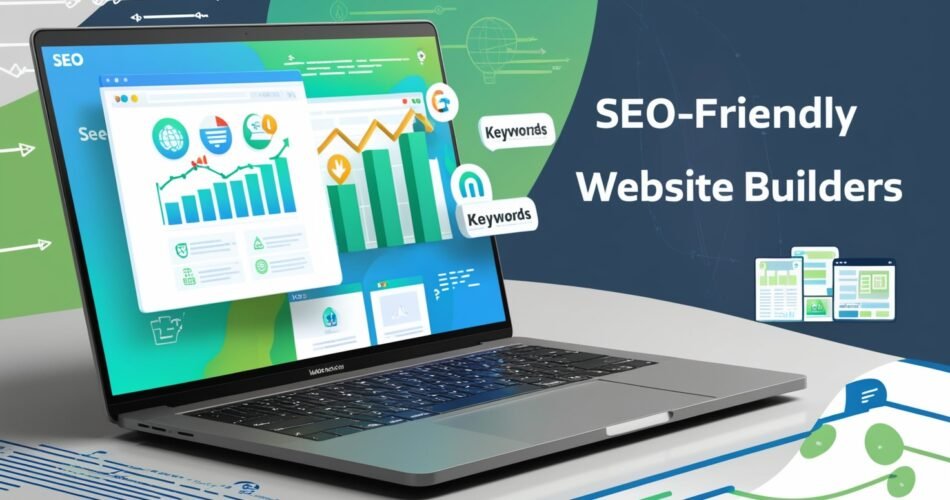Table of content
Introduction
In the digital age, creating a website is essential for any business or individual looking to establish an online presence. But simply having a website isn’t enough; you need to make sure it’s visible to your target audience. That’s where SEO (Search Engine Optimization) comes in. One of the critical decisions you’ll make when building a website is choosing the right website builder. This decision can significantly impact your SEO efforts, making it easier or harder to rank high on search engines like Google. So, how do you choose the best website builder for SEO? Let’s dive into it.
Understanding Website Builders
What is a Website Builder?
A website builder is a tool or platform that allows you to create a website without needing to write any code. These tools are designed to be user-friendly, enabling anyone, regardless of technical skill, to build and launch a professional-looking website. They come with pre-designed templates, drag-and-drop functionality, and a host of other features that simplify the web design process.
Key Features of Website Builders
Most website builders offer a range of features including customizable templates, domain name registration, hosting services, and customer support. However, when it comes to SEO, specific features such as meta tags, URL structures, and mobile optimization are crucial.
Types of Website Builders
There are two primary types of website builders: drag-and-drop builders and content management systems (CMS).
Drag-and-Drop Builders
These are the most user-friendly website builders. They allow you to build a website by simply dragging and dropping elements like text boxes, images, and buttons onto a page. Examples include Wix and Weebly.
Content Management Systems (CMS)
CMS platforms like WordPress offer more advanced features and greater flexibility. They are ideal for those who have some technical knowledge or are willing to learn. WordPress, in particular, is known for its strong SEO capabilities.
Why Choosing the Best Website Builder for SEO Matters
SEO is crucial because it determines how easily your website can be found by search engines. Without good SEO, your website might as well be invisible.
The Role of SEO in Online Visibility
SEO involves optimizing various elements of your website, such as content, images, and meta tags, to make it more attractive to search engines. The better your SEO, the higher your website will rank in search engine results, leading to more traffic and potential customers.
SEO Challenges with Website Builders
While website builders make it easy to create a website, they can sometimes limit your SEO efforts. Some builders offer limited control over technical SEO aspects like URL structure, site speed, and mobile optimization.
Best Website Builder for SEO: Top Options
Wix
SEO Features of Wix
Wix offers several SEO tools, including the Wix SEO Wiz, which provides a personalized SEO plan. You can customize meta tags, URLs, and alt text for images. Wix also supports 301 redirects and has an SSL certificate, both of which are important for SEO.
Pros and Cons of Using Wix for SEO
- Pros: User-friendly, personalized SEO plans, mobile optimization.
- Cons: Limited control over certain technical SEO aspects, slower page speeds compared to other builders.
WordPress
SEO Features of WordPress
WordPress is widely regarded as the best platform for SEO. It offers a range of plugins like Yoast SEO, which help you optimize your site for search engines. You have complete control over every aspect of your SEO, from meta tags to site structure.
Pros and Cons of Using WordPress for SEO
- Pros: Extensive SEO features, highly customizable, large community support.
- Cons: Steeper learning curve, may require additional costs for plugins and hosting.
Squarespace
SEO Features of Squarespace
Squarespace offers built-in SEO tools, including the ability to customize meta tags, image alt text, and URLs. It also automatically generates clean URLs and includes an SSL certificate.
Pros and Cons of Using Squarespace for SEO
- Pros: Beautiful design templates, built-in SEO features, mobile-responsive designs.
- Cons: Less flexibility compared to WordPress, limited third-party integrations.
Shopify
SEO Features of Shopify
Shopify is an e-commerce-focused website builder that offers several SEO tools. You can customize title tags, meta descriptions, and URLs. Shopify also automatically generates a sitemap.xml file, which is essential for SEO.
Pros and Cons of Using Shopify for SEO
- Pros: Strong e-commerce features, built-in SEO tools, fast loading times.
- Cons: Limited customization compared to CMS platforms, costs can add up with additional apps and themes.
Weebly
SEO Features of Weebly
Weebly provides basic SEO features, including customizable meta tags and alt text. It also offers an SSL certificate and a built-in blogging platform, which is great for content marketing.
Pros and Cons of Using Weebly for SEO
- Pros: Easy to use, affordable, includes basic SEO features.
- Cons: Limited SEO control, fewer customization options.
How to Choose the Best Website Builder for SEO
Consider Your SEO Goals
Before choosing a website builder, it’s essential to consider your SEO goals. Are you looking to drive massive traffic to your site, or is your focus more on local SEO? Your goals will influence the features you need.
Evaluate SEO Features
On-Page SEO Tools
Look for builders that offer strong on-page SEO tools, such as customizable meta tags, headings, and alt text. These tools are crucial for optimizing individual pages.
Mobile Optimization
With more people browsing the web on their phones, mobile optimization is no longer optional. Choose a builder that automatically optimizes your site for mobile devices.
Speed and Performance
Page speed is a significant ranking factor in SEO. Ensure that your chosen builder is known for fast loading times and high performance.
Ease of Use and Flexibility
Customization Options
The ability to customize your website is crucial for SEO. Some builders offer more flexibility than others, allowing you to fine-tune every aspect of your site.
Learning Curve
Consider how much time you’re willing to invest in learning the platform. Some builders, like WordPress, offer extensive SEO features but require more time to master.
4 Tips for Maximizing SEO with the Best Website Builder for SEO
1- Optimize Content for Keywords
Keyword optimization is a fundamental aspect of SEO. Ensure your content is rich in relevant keywords but avoid keyword stuffing.
2- Utilize SEO Plugins and Tools
If your builder supports plugins, like WordPress does, take advantage of SEO plugins like Yoast or All in One SEO. These tools can guide you in optimizing your site effectively.
3- Regularly Update Your Site
When using the best website builder for SEO, ensure you’re optimizing content effectively and making regular updates, search engines love fresh content, and regularly updating your website can positively impact your SEO. Whether it’s a new blog post, a product update, or a design tweak, consistent updates signal to search engines that your site is active and relevant.
4- Monitor and Analyze SEO Performance
To ensure that your SEO strategies are working, it’s essential to monitor and analyze your website’s performance. Tools like Google Analytics and Google Search Console can provide valuable insights into your site’s traffic, bounce rate, and keyword rankings. Regularly reviewing this data allows you to adjust your SEO tactics as needed.
Conclusion
Choosing the the best website builder for SEO is crucial for your success. Each platform has its strengths and weaknesses, and the best choice depends on your specific needs and goals. For those who prioritize flexibility and advanced SEO features, WordPress remains the top choice. However, if you’re looking for ease of use and integrated SEO tools, Wix or Squarespace might be the better options. Shopify stands out for e-commerce businesses, while Weebly offers a straightforward, budget-friendly solution. Whichever platform you choose, remember that your SEO efforts don’t stop once your site is built. Consistently optimizing, updating, and analyzing your site is key to maintaining and improving your search engine rankings.
FAQs
Can I switch website builders without losing SEO?
Switching website builders can potentially impact your SEO, especially if the new platform handles URLs and site structure differently. To minimize SEO disruption, ensure that you set up proper 301 redirects from old URLs to new ones and maintain your site’s existing content and metadata.
Do free website builders offer good SEO features?
Free website builders often come with limited SEO features. While they can be a good starting point, they may not offer the advanced tools needed to fully optimize your site for search engines. Investing in a paid plan usually provides better SEO capabilities.
How long does it take to see SEO results with a new website builder?
SEO is a long-term strategy, and it can take several months to see significant results. The timeline depends on factors like the competitiveness of your industry, the quality of your content, and how well you optimize your site. Patience and consistency are key.
Is WordPress really the best for SEO?
WordPress is highly regarded for its SEO capabilities due to its flexibility, extensive plugin options, and control over site elements like metadata and URLs. While it’s a powerful platform for SEO, the best choice depends on your specific needs and technical expertise.
How do I ensure my website builder is SEO-friendly?
To ensure your website builder is SEO-friendly, look for features like customizable meta tags, mobile optimization, fast loading times, and integration with SEO tools. It’s also important to choose a builder that allows you to have control over your site’s structure and content.


